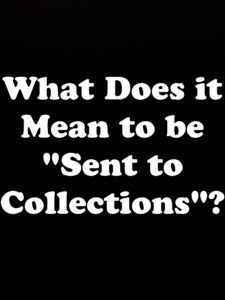By: Robert J. Nahoum
I have often heard consumers tell me that they have been “sent to collections†or that a creditor has threatened that if a payment is not made, he or she will be “sent to collectionsâ€?  I think at one time or another we’ve all heard this threat but what exactly does it mean? What happens at “collectionsâ€, what can they do to you?
To understand what it means to be sent to collections you must first understand the life cycle of a consumer debt and who the various players are. Let’s start with the “creditorâ€, that’s the company that extended you credit in the first place. The most familiar example is the bank with which you have a credit card but can also include banks making car loans, cell phone companies even doctors and hospitals.
In order for a creditor to send you to collections a “default†must first occur. A default is simply the failure to make a payment on time. Once a default occurs, the creditor will usually try to collect “in-houseâ€. Collecting in-house simply means that the creditor’s own collection department will be trying to collect the debt by calling you and sending letters and reporting the account as delinquent to the credit reporting agencies. For the most part, creditors will attempt in-house collections for up to 120 days after default.
It is usually during in-house collections where you will first hear the threat that you will be “sent to collections.â€Â In a letter, a phone call or perhaps both, the creditor will warn that if payment is not received, you will be “sent to collections.â€Â This ominous threat simply means that your account will now be out sourced for collection. The bigger issue is outsourced to whom? The answer generally depends on how much the debt is and what the individual creditor’s practices are.
For small balances, usually under $1,000.00, the account will be sent to an outside collection agency that will do little more than send debt collection letters and make phone call. The debt collection letters and the phone calls will usually offer some kind of settlement either by lump sum or payments over time.
For larger accounts, many creditors sell the accounts to debt buyers.  Debt buyers, as the name suggest, buy debts from creditors and try to collect the balance for their own wallets. The debt buyers’ primary means of debt collection is suing consumers in court. However, debt collection lawsuits brought by debt buyers differ significantly from those brought by original creditors because debt buyers often lack the proof needed to win the case. In a debt collection lawsuit, the Plaintiff (the party bringing the lawsuit) always has the burden to prove that the Defendant (the party being sued) is responsible for the debt. To meet this burden, a debt buyer must prove that (1) it has the right to sue you; (2) the debt is yours; and (3) you owe the amount for which you were sued. It is never the burden of the Defendant to prove that he or she does not owe the debt.
To prove that a debt buyer owns your debt, it must show how it came to acquire it. The sale of a debt from a creditor to a debt buyer or from one debt buyer to another is memorialized through an “assignment†in which the original creditor “assigns†ownership (and the right to collect the debt) to a new creditor. To be valid, the assignment must sufficiently identify your particular debt.
Often, debts are sold and resold over and over again to a number of subsequent debt buyers. When this happens, the debt buyer must prove each and every assignment by showing a “chain of title†reaching all the way back in history to the original creditor. Again, each assignment must sufficiently identify your particular debt.
The most significant consequence of being sent to collections is that third-party debt collectors (NOT original creditors), must comply with federal debt collection laws know as the Fair Debt Collection Practices Act (“FDCPA†for short). The FDCPA is a comprehensive law that prohibits a catalog of activities in connection with the collection of debts by third parties. The FDCPA imposes civil liability on any person or entity that violates its provisions and establishes general standards of debt collector conduct, defines abuse, and provides for specific consumer rights. The operative provisions of the FDCPA declare certain rights to be provided to or claimed by debtors, forbid deceitful and misleading practices, prohibit harassing and abusive tactics, and proscribe unfair or unconscionable conduct, both generally and in a specific list of disapproved practices.
The FDCPA includes a private right of action under which a consumer may sue a debt collector for FDCPA violations. If a debt collector is found to have violated the FDCPA, the consumer may recover up to $1,000.00 in statutory damages, plus actual damages (for example pain and suffering) and most importantly, your reasonable attorneys’ fees. Like many other consumer protection laws, the FDCPA is what is called “fee shifting†– meaning that the obligation to pay the consumers attorneys’ fees shifts to the debt collector. The FDCPA empowers the consumer to swing the pendulum in the other direction and sue the debt collector for its wrongful conduct.
If you need help settling or defending a debt collection law suit, stopping harassing debt collectors or suing a debt collector, contact us today to see what we can do for you.
The Law Offices of Robert J. Nahoum, P.C
(845) 232-0202
www.nahoumlaw.com
info@nahoumlaw.com

